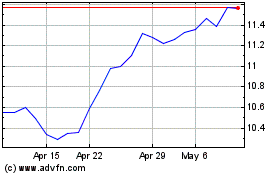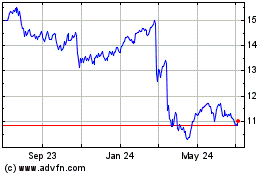By Saabira Chaudhuri
As head of the company that makes Lysol and other popular
disinfectants, Laxman Narasimhan has a close-up view of how
consumers around the planet are trying to protect themselves from
the new coronavirus.
"As the pandemic goes on for a while, the real question is: Does
it change people's behavior in the long run?" said the chief
executive of Reckitt Benckiser Group PLC, whose products include
cold brand Mucinex, Airborne vitamin supplements, Durex condoms,
Enfamil infant formula and Dettol, one of the biggest antiseptic
brands outside the U.S.
Mr. Narasimhan, who joined the British consumer-products giant
last summer from PepsiCo, is betting it does. Before the outbreak,
the 52-year-old executive crafted a strategy to reinvigorate
Reckitt Benckiser's flagging sales, casting hygiene -- and many of
the company's brands -- as a cornerstone of health. There is
history there: The first Lysol-brand disinfectant was introduced in
the late 1800s to help battle a cholera epidemic in Germany and was
promoted as a countermeasure during the Spanish flu pandemic of
1918.
Now, even as the coronavirus pandemic disrupts his supply
chains, Mr. Narasimhan expects it to accelerate that strategy, as
Reckitt's Lysol cleaners and Dettol soap and sanitizers fly off
shelves.
He recently spoke by phone to The Wall Street Journal from his
living room in London, where he is on lockdown. Here are edited
excerpts.
WSJ: What trends has the pandemic triggered that could stick
around?
Mr. Narasimhan: E-commerce and digital will be even bigger.
Supply can't keep up with demand right now, but we're seeing more
older people using e-commerce.
There will also be a new depth to planning supply-chain
resilience. And in some industries you'll see a shakeout where the
companies that win are ones that understand consumers.
WSJ: How have you dealt with supply-chain disruptions?
Mr. Narasimhan: In China, we flew ingredients there that would
typically have come on boats or trucks. If an ingredient we bought
in China wasn't available because that factory was shut down, we
imported it from Europe.
We put in place measures to ensure people were safe -- check,
test, trace, isolate -- and we didn't have people infected. We
increased the number of buses running to factories so there was
social distancing on the bus. For some people we had to rent hotels
in Hubei province due to travel restrictions. Now we're
transporting these ideas and practices around the world to ensure
we keep our people safe as this spreads.
WSJ: What about other big markets?
Mr. Narasimhan: We've been in close contact with our [retailer
and wholesaler] customers in many countries who are narrowing
product ranges to things that really sell. For Lysol, for instance,
which is made in the U.S. and Mexico, you might need fewer
fragrances and sizes. At our factories and distribution centers
there, we're simplifying assortment. That helps us produce quicker
since you don't have the downtime from switching lines.
WSJ: The French health minister recently tweeted that Ibuprofen
-- which your brand Nurofen contains -- could make Covid-19
symptoms worse. How have you responded?
Mr. Narasimhan: Our medical team got together immediately. We
said, "Where is the evidence?" From our perspective, which is
shared by the WHO, there is no data we have seen that suggests that
what was tweeted was based on facts. Other agencies have stepped in
since. It's very hard for us, as a brand, to step in.
WSJ: Condom sales rose during the 2008-2009 recession. How have
Durex sales been affected since the outbreak, given that this time
people are stuck indoors?
Mr. Narasimhan: There are definitely fewer people buying that
single-serve condom from a vending machine. Also, when people stop
going to stores, or don't hang around a store, sales of the things
I'd consider impulse categories go down. But we also sell direct to
consumers online and are seeing more people using e-commerce to buy
them.
WSJ: How do you go about leading a large, global company
remotely, particularly when you're so new to the job?
Mr. Narasimhan: I'm seeing people all the time, just on screen.
I was supposed to be in the Americas last week and we kept the
meeting -- just did it virtually. You've got to be extremely
organized about how you deal with a crisis. Every evening at 6
there's a core group of us who get on video to talk, and we have a
dashboard -- a customized online platform -- to track key metrics
like safety, people, performance, any emerging crises.
You also need to think about how you engage people. I took today
off just to think. If you don't create time to think, all you're
doing is responding.
WSJ: How's the adjustment been?
Mr. Narasimhan: In England, the home is a very private place,
but now suddenly you're dialing into the home. We're trying to
encourage people to turn their cameras on. I did a video for
employees here in my living room where I showed them the room and
photos of my family. I want people to feel their leader has no
problem doing this.
My wife and kids are still in the U.S., but my 79-year-old
mother lives here with me in West London. The other day she walked
into one of my video meetings and said, "You haven't taken the
garbage out." I had to stop the meeting and take care of it.
Write to Saabira Chaudhuri at saabira.chaudhuri@wsj.com
(END) Dow Jones Newswires
April 06, 2020 07:40 ET (11:40 GMT)
Copyright (c) 2020 Dow Jones & Company, Inc.
Reckitt Benckiser (PK) (USOTC:RBGLY)
Historical Stock Chart
From Mar 2024 to Apr 2024

Reckitt Benckiser (PK) (USOTC:RBGLY)
Historical Stock Chart
From Apr 2023 to Apr 2024
